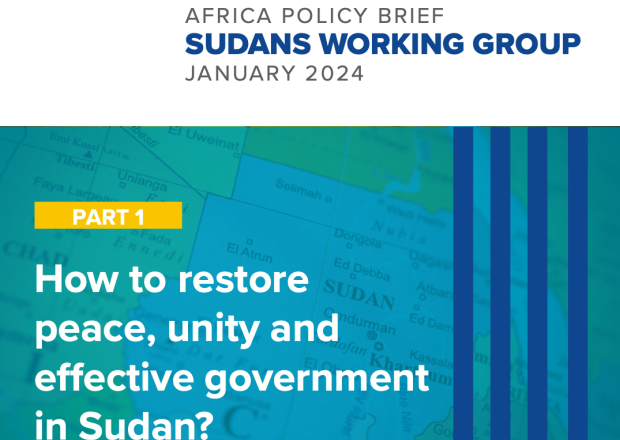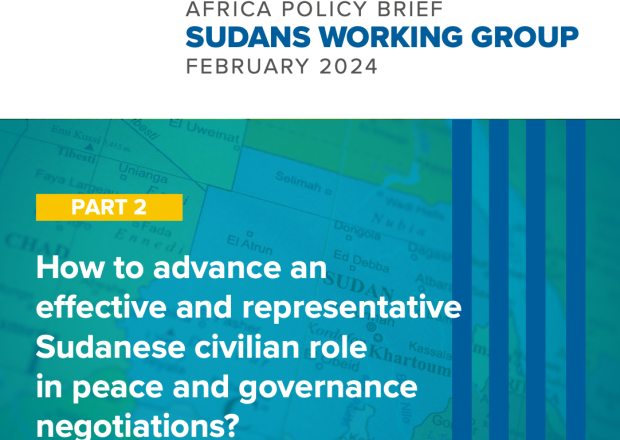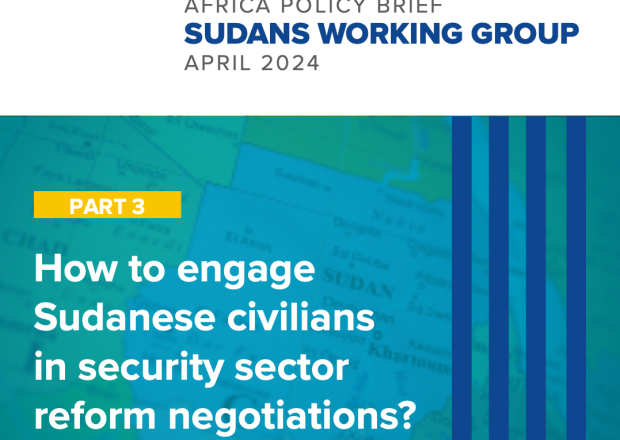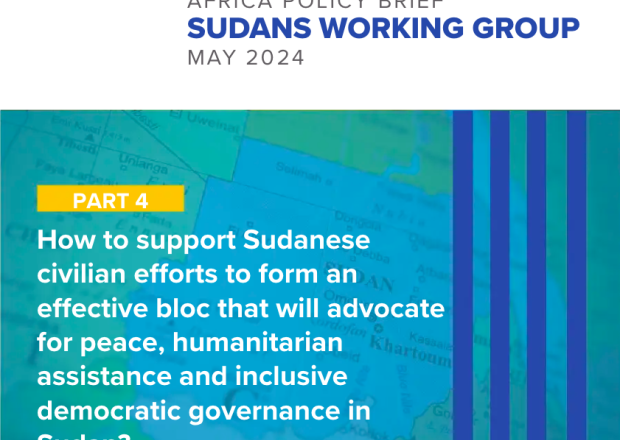Sudans Working Group Policy Brief Series
Since its independence in 1956, Sudan has been no stranger to internal strife. The nation has faced a series of violent conflict and, in 2011, the southern third of Sudan became independent South Sudan. Most recently, April 2023 marked the commencement of the War in Sudan, an internal conflict between two warring military factions which has killed thousands and displaced millions.
As local, regional and international stakeholders work toward sustainable peace in the nation, it is critical to center the insights of civilians and those on the ground. Thus, the Africa Program's Sudans Working Group has initiated a four-part discussion series to ensure a diverse range of Sudanese civilian voices are taken into consideration as the United States and other key external actors develop and implement policies regarding Sudan.

How to Restore Peace, Unity, and Effective Government in Sudan?
Sudan is no stranger to internal conflict. Its first civil war had begun just as Sudan gained independence in 1956. Fifty-five years and millions of war-related deaths later, the southern third of Sudan became independent South Sudan. The first discussion session focused on how to convince the leading generals to stop fighting and, in particular, what external actors might do toward that end.
Learn More
How to Advance an Effective and Representative Sudanese Civilian Role in Peace and Governance Negotiations?
Ten months after fighting broke out between the Sudanese Armed Forces (SAF) and the paramilitary Rapid Support Forces (RSF), Sudan remains a more divided and in desperate humanitarian condition than ever. The fighting has displaced 8 million Sudanese and left 18 million facing acute hunger. Humanitarian access remains severely restricted and the SAF and RSF seem determined to vanquish the other, a goal never achieved in Sudan’s previous decades-long civil wars. Civilian political and civil society actors are also becoming entrenched into rival groups. Divisions of Sudan’s civilian political actors in the past provided openings and justification for repeated military coups and governments. The second discussion session, held on February 22, 2024, focused on how peace and future governance negotiations can be configured so that a diverse array of Sudanese civilian voices can be effectively heard and taken into account.
Learn More
How to Engage Sudanese Civilians in Security Sector Reform Negotiations?
The ostensible trigger for the outbreak of hostilities between the Sudan Armed Forces (SAF) and the Rapid Support Forces (RSF) on April 15, 2023, was disagreement about the nature and timing of merging Sudan’s two legally constituted armed forces. SSR was one of five issues left for further negotiation when a “Framework Agreement” was being negotiated in December 2022, between the SAF, RSF and civilian representatives led by the Forces for Freedom and Change (FFC) for creation of a new transitional government. With neither the SAF nor the RSF in a position to “win” the now year-old civil war, any negotiated peace will need to address the issue of security sector reform. Given the major, long-standing role the security forces, especially the SAF, have played in the politics and economy of Sudan, SSR in the Sudanese context will be more complicated than a force integration/force reorganization matter. Sudan’s citizens thus have legitimate interests, like nature of the economy, budgetary priorities and balancing human versus state security, that warrant their having a meaningful role in SSR negotiations. As one of the April 2 session speakers said, SSR must be guided by a political and national agenda, not a purely military one.
Learn More
How to support Sudanese civilian efforts to form an effective bloc that will advocate for peace, humanitarian assistance and inclusive democratic governance in Sudan?
Civil conflicts have been resolved in two ways, military victory or via a negotiated settlement. A major criticism of negotiated settlements is that the combatants reach agreement among themselves for their own benefit and the civilian population that must live with the outcome have no say in it. Another criticism is that peace deals between armed actors tend to be pauses in hostilities as underlying grievances remain unresolved and/or ambitions unfulfilled. The proposed answer to these shortcomings of negotiated settlements is to include independent civilian participation in the negotiations in order to give any resulting agreement greater popular support/legitimacy. The fourth session focused on the recent efforts of civilian representatives to agree on principles that would unite them in advocating for cessation of hostilities, promoting an effective response to Sudan’s humanitarian crisis and charting a path toward inclusive, civilian, democratic governance of Sudan.
Learn MoreThe Sudans Working Group (SWG) engages US, African, and international policymakers and stakeholders in inclusive and forward-leaning policy dialogue aimed at advancing the prospects for peace, security, and development between and within Sudan and South Sudan. The SWG serves as a space for key stakeholders to share analyses and perspectives and provide policy options for addressing critical issues related to the two countries. The SWG is currently co-chaired by Ambassador Nureldin Satti and Ambassador Donald E. Booth.